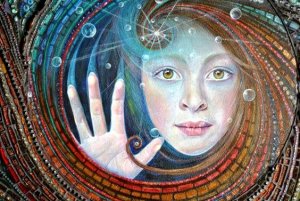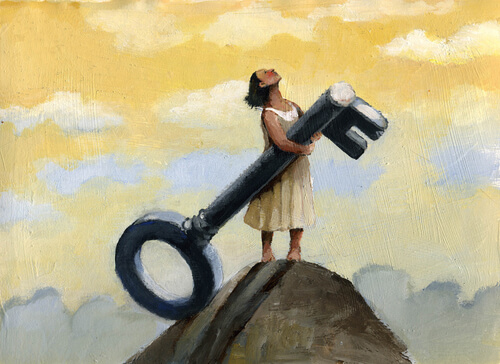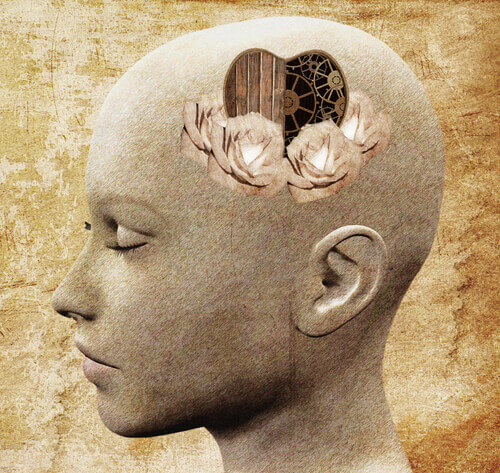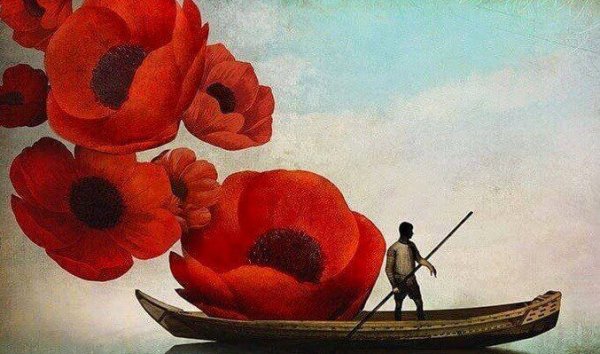Self-Reflection: The Key To Personal Growth And Emotional Freedom


Written and verified by the psychologist Valeria Sabater
Self-reflection invites us to detach ourselves from certainties and to question rigid ideas. In turn it reminds us that we are free beings, people with the ability to be independent when making decisions. Few dimensions of personal growth favor such an intimate and full connection with one’s inner self. Self-reflection helps us to ask ourselves what we really want out of life and what it is that gives us happiness.
No one will be surprised to learn that many of the personal development gurus call self-reflective consciousness “the art forgotten by psychology.” This is for a very simple reason. Our society has reached a point where it is much easier to blame bad fortune or other people for what happens to us. Instead of this we should have the courage, or the psychological capacity, to realise that much of what happens to us is a consequence of our actions, whether these are avoidable or not.
“Life is very simple, but we insist on it being complicated”
-Confucious-
If I feel miserable it’s because my partner doesn’t know how to make me happy. Not having any friends I can trust is because everybody is selfish. If I fail an exam over and over again, it’s because the teacher has it in for me. If I just can’t free myself from unhappiness and frustration for a single day, it’s because the world doesn’t appreciate what I’m worth.
We’ve all heard people say that we need to always find a cause for everything that happens or look for someone to blame. We may have this from friends, relatives, a classmate or at work. Dysfunctional problems in families can be put down to losing the art of self-reflection. We can also trace the breakdown of relationships and the conflicts that arise to having lost this art.
If a person isn’t able to question certain situations, they will feel very dissatisfied. If that same person is not able to understand their own emotions, to learn from mistakes or to take responsibility for their own actions and their consequences, they will live in a mental state where this lack of thinking will generate one single result: unhappiness.

Self-reflection, a trip to our inner-self to achieve well-being
Many of us have, at some point or another, said to ourselves “I just have to travel”. “I’ve got to get away, I must cross my own personal borders to get to know myself”. Little by little we’ll realize we don’t really need to change our physical location to find that true version of our ourselves. The truth is that wherever we go we will always remain the same. Knowledge is found inside us and comes directly from self-reflection.
Likewise, it’s good to remember that this ability isn’t learnt overnight. It’s a process of growth where we can see our reality through different windows. Where we can ask ourselves challenging questions that will open our minds. This will help us to question everything that surrounds us, and even ourselves. Self-reflection is the engine of personal growth, a journey which we all have a ticket for.
And yet, as strange as it may seem, we don’t always make good use of it.
Self-reflection is the key to success
When we talk about “success” we aren’t referring exclusively to us reaching a privileged position in society. Success is, above all, well-being, and is the ability to be creators of our own happiness in any area of our lives. According to Daniel Goleman’s research, self-reflection is crucial for us to be able to develop an appropriate emotional intelligence.
We must understand what psychologists define as “self-reflective awareness”. It is actually a “metacognitive” ability that we can all train and empower. It means, above all, to be able to think and reflect on one’s own mental and emotional processes in order to understand and master them.
Someone with a good capacity for self-reflection is a person capable of managing their impulses. It is someone who plans and who has a satisfactory social conscience. And, in turn, they understand that life is a continuous learning process in which we should be receptive to everything that surrounds us.
This type of person is capable of establishing a healthy and useful internal dialogue with which to discover errors, shortcomings, insecurities, and unease, in order to heal and grow into a better person day by day.

On the other hand, it is worth remembering what Emmanuel Kant once said in The Critique of Pure Reason. For this Königsberg philosopher, the exterior, that which surrounds us, is in fact the reflection of our inner self. And so, if our inner image is characterized by low self-esteem, rigid thinking, and a non-existent capacity for self-reflection, then all of these negative characteristics will make us see the outside world as oppressive, gray, and with nothing to offer us.
Keys to developing good self-reflection
This should be more than a purpose, it should be a necessity. Developing good self-reflection is a daily objective in which we should invest effort and willpower to become what we crave: free people. We could see it as a rebirth, as an awakening to consciousness, an illumination or “insight”, similar to what we were taught in the Matrix movie. We can discover that we aren’t obliged to constantly please other people. We’ve all got a voice and the right tools to be what we want. To achieve this, we can work on the following areas:
1. Deepen your education, know your family history
In order to get to know ourselves, a good option is investigate our roots. Sometimes a particular style of parenting or a specific type of education determines what we are now and even the way we see ourselves.
2. Understand your needs, motivations and emotions
Human beings have social impulses. We have a need for intimacy, a desire to belong to a certain social group, and to achieve certain objectives.
If we understand our motivations, we will also understand many of our emotions. Moreover, we will sometimes discover that many of these desires are simple bonds that don’t favor our personal growth at all.

3. Understand your defense mechanisms
Our defense mechanisms are activated when our identity is threatened or when we are exposed to some painful information about ourselves. Being aware of what causes these reactions and of what defensive strategies we normally use will undoubtedly give us objective information about our deepest fears, shortcomings, and needs.
4. Delve into your strengths and weaknesses
People are a compendium of greatness and weakness, virtues and defects, lights and shadows. Being aware of each of these dimensions and delving into them, will undoubtedly offer us an essential tool to work on our self-reflection.
5. What are your purposes in life?
A life without purpose is just an existence. A mind without goals doesn’t prosper, isn’t happy, and lacks motivation and reasons to get up every morning. Let’s make a list of the purposes that define our lives at this present time. Let’s delve into why they are so important to us, and what we are doing to achieve them and make them ours.
“If you don’t want to feel continually frustrated, avoid wishing for things that don’t depend on you”
-Epicteto-

6. Be aware of the “cultural and social bubble” that surrounds you.
Self-reflection has no point or purpose if we don’t use it with a critical perspective. How does the society in which I live influence me? Am I a slave to fashion? Do I worry a lot about what people will think of me? Do I prioritize fitting in ahead of following my real desires?
7. Create a daily habit of self-reflection
We should set aside at least half an hour a day to practice self-reflection. Let’s focus on the important things in life, on our emotional and mental states, on what surrounds us. Let’s practice mindfulness, keep a diary, walk, paint or remain silent for good lengths of time in a quiet place.
To conclude, let’s make self-reflection a conscious habit where we dare to be a little more free each day. Let’s leave aside superficiality, fears and the lukewarmness of the comfort zone. And let’s develop a true well-being where we can find ourselves again. Where we can find that person we have often neglected and whose hand we have let go all too often.
Bibliography
Genie, Daniel (2017). “Triple Focus”. Zeta PocketDyer.
Wayne (2010). “Your wrong areas” DeBolsillo.
Jung, Carl (2010). “Memories, dreams, thoughts” New Collection.
Self-reflection invites us to detach ourselves from certainties and to question rigid ideas. In turn it reminds us that we are free beings, people with the ability to be independent when making decisions. Few dimensions of personal growth favor such an intimate and full connection with one’s inner self. Self-reflection helps us to ask ourselves what we really want out of life and what it is that gives us happiness.
No one will be surprised to learn that many of the personal development gurus call self-reflective consciousness “the art forgotten by psychology.” This is for a very simple reason. Our society has reached a point where it is much easier to blame bad fortune or other people for what happens to us. Instead of this we should have the courage, or the psychological capacity, to realise that much of what happens to us is a consequence of our actions, whether these are avoidable or not.
“Life is very simple, but we insist on it being complicated”
-Confucious-
If I feel miserable it’s because my partner doesn’t know how to make me happy. Not having any friends I can trust is because everybody is selfish. If I fail an exam over and over again, it’s because the teacher has it in for me. If I just can’t free myself from unhappiness and frustration for a single day, it’s because the world doesn’t appreciate what I’m worth.
We’ve all heard people say that we need to always find a cause for everything that happens or look for someone to blame. We may have this from friends, relatives, a classmate or at work. Dysfunctional problems in families can be put down to losing the art of self-reflection. We can also trace the breakdown of relationships and the conflicts that arise to having lost this art.
If a person isn’t able to question certain situations, they will feel very dissatisfied. If that same person is not able to understand their own emotions, to learn from mistakes or to take responsibility for their own actions and their consequences, they will live in a mental state where this lack of thinking will generate one single result: unhappiness.

Self-reflection, a trip to our inner-self to achieve well-being
Many of us have, at some point or another, said to ourselves “I just have to travel”. “I’ve got to get away, I must cross my own personal borders to get to know myself”. Little by little we’ll realize we don’t really need to change our physical location to find that true version of our ourselves. The truth is that wherever we go we will always remain the same. Knowledge is found inside us and comes directly from self-reflection.
Likewise, it’s good to remember that this ability isn’t learnt overnight. It’s a process of growth where we can see our reality through different windows. Where we can ask ourselves challenging questions that will open our minds. This will help us to question everything that surrounds us, and even ourselves. Self-reflection is the engine of personal growth, a journey which we all have a ticket for.
And yet, as strange as it may seem, we don’t always make good use of it.
Self-reflection is the key to success
When we talk about “success” we aren’t referring exclusively to us reaching a privileged position in society. Success is, above all, well-being, and is the ability to be creators of our own happiness in any area of our lives. According to Daniel Goleman’s research, self-reflection is crucial for us to be able to develop an appropriate emotional intelligence.
We must understand what psychologists define as “self-reflective awareness”. It is actually a “metacognitive” ability that we can all train and empower. It means, above all, to be able to think and reflect on one’s own mental and emotional processes in order to understand and master them.
Someone with a good capacity for self-reflection is a person capable of managing their impulses. It is someone who plans and who has a satisfactory social conscience. And, in turn, they understand that life is a continuous learning process in which we should be receptive to everything that surrounds us.
This type of person is capable of establishing a healthy and useful internal dialogue with which to discover errors, shortcomings, insecurities, and unease, in order to heal and grow into a better person day by day.

On the other hand, it is worth remembering what Emmanuel Kant once said in The Critique of Pure Reason. For this Königsberg philosopher, the exterior, that which surrounds us, is in fact the reflection of our inner self. And so, if our inner image is characterized by low self-esteem, rigid thinking, and a non-existent capacity for self-reflection, then all of these negative characteristics will make us see the outside world as oppressive, gray, and with nothing to offer us.
Keys to developing good self-reflection
This should be more than a purpose, it should be a necessity. Developing good self-reflection is a daily objective in which we should invest effort and willpower to become what we crave: free people. We could see it as a rebirth, as an awakening to consciousness, an illumination or “insight”, similar to what we were taught in the Matrix movie. We can discover that we aren’t obliged to constantly please other people. We’ve all got a voice and the right tools to be what we want. To achieve this, we can work on the following areas:
1. Deepen your education, know your family history
In order to get to know ourselves, a good option is investigate our roots. Sometimes a particular style of parenting or a specific type of education determines what we are now and even the way we see ourselves.
2. Understand your needs, motivations and emotions
Human beings have social impulses. We have a need for intimacy, a desire to belong to a certain social group, and to achieve certain objectives.
If we understand our motivations, we will also understand many of our emotions. Moreover, we will sometimes discover that many of these desires are simple bonds that don’t favor our personal growth at all.

3. Understand your defense mechanisms
Our defense mechanisms are activated when our identity is threatened or when we are exposed to some painful information about ourselves. Being aware of what causes these reactions and of what defensive strategies we normally use will undoubtedly give us objective information about our deepest fears, shortcomings, and needs.
4. Delve into your strengths and weaknesses
People are a compendium of greatness and weakness, virtues and defects, lights and shadows. Being aware of each of these dimensions and delving into them, will undoubtedly offer us an essential tool to work on our self-reflection.
5. What are your purposes in life?
A life without purpose is just an existence. A mind without goals doesn’t prosper, isn’t happy, and lacks motivation and reasons to get up every morning. Let’s make a list of the purposes that define our lives at this present time. Let’s delve into why they are so important to us, and what we are doing to achieve them and make them ours.
“If you don’t want to feel continually frustrated, avoid wishing for things that don’t depend on you”
-Epicteto-

6. Be aware of the “cultural and social bubble” that surrounds you.
Self-reflection has no point or purpose if we don’t use it with a critical perspective. How does the society in which I live influence me? Am I a slave to fashion? Do I worry a lot about what people will think of me? Do I prioritize fitting in ahead of following my real desires?
7. Create a daily habit of self-reflection
We should set aside at least half an hour a day to practice self-reflection. Let’s focus on the important things in life, on our emotional and mental states, on what surrounds us. Let’s practice mindfulness, keep a diary, walk, paint or remain silent for good lengths of time in a quiet place.
To conclude, let’s make self-reflection a conscious habit where we dare to be a little more free each day. Let’s leave aside superficiality, fears and the lukewarmness of the comfort zone. And let’s develop a true well-being where we can find ourselves again. Where we can find that person we have often neglected and whose hand we have let go all too often.
Bibliography
Genie, Daniel (2017). “Triple Focus”. Zeta PocketDyer.
Wayne (2010). “Your wrong areas” DeBolsillo.
Jung, Carl (2010). “Memories, dreams, thoughts” New Collection.
This text is provided for informational purposes only and does not replace consultation with a professional. If in doubt, consult your specialist.







